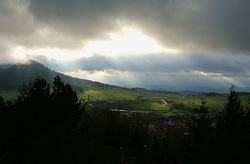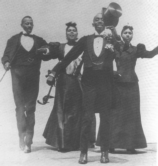\ˈglō-miŋ\
| I have been in Maryland for the last couple of days visiting my brother—we’ve spent several lovely long summer evenings sitting on the porch in the gloaming, discussing family lore, and watching fireflies. We agree that gloaming is a very fine word. (He put in a plug for “crepuscular,” which is also a fine word, but we’ve been Latinate here for a few weeks now and it’s time to change that up. Get your own blog, bro.) |
I really like this, because gloaming describes that moment poised right on the balance-point between glow and gloom—twilight. Where we sit, watching fireflies and trading stories.
The word fell out of favor in English for a while, but the Scots (God bless them) kept it current. I can see why they hung on to it: a word like that is especially useful in a place like Scotland that has generous endowments of both gloom and glow.
Take one of the OED usage citations: “This fell furth in the gloming” (1620). Not a very illuminating or exciting quote, but the “furth” part caught my eye. So I tracked down the reference in Robert Pitcairn’s Ancient Criminal Trials of Scotland (which turned out to be a very entertaining read, btw!) And I got a family story. Here's what went down in the gloaming:
Sir James MacDonald, 9th chief of Clan MacDonald of Dunnyveg, was being held in Edinburgh Castle, accused of committing acts of mayhem against various rivals, including his own father. (The indictment says that young James went to his father’s house in the dead of night with 300 “barbarus, wikked and bludie Hieland-men” in tow, barricaded his father inside the house and then set it on fire when he refused to yield himself up. [The parents survived.])
While locked up, MacDonald and a fellow prisoner somehow tricked their guards into dropping their swords and leaving the room. (I like to imagine they pointed and said something like “Hey! What’s THAT over THERE?!?!”) At any rate, once the guards had obligingly disarmed and turned around, the prisoners shut them in a shed, took the swords, rushed the Castle gate, and escaped over the wall. The other prisoner got clean away but MacDonald, who was wearing leg irons throughout these escapades, broke his ankle when he jumped from the parapet. He was eventually found hiding in a dunghill and taken back into custody. Condemned to be beheaded, he managed to escape again (more successfully this time) and made his way to Spain.
Our own family stories are mostly less harrowing. There’s the cousin who is said to have deserted from the Confederate Army. There’s the great great grandmother who may have had an affair with Sanford White. There’s the Quaker ancestor who was whipped for refusing to report for military service. No one shows up at his parents' house with a hundred bloodthirsty thugs, but there is war, madness, adultery, criminality, and desertion (both marital and martial). There are ordinary people leading lives that flash out for a moment and then go dark.
There is gloom, and there is glow.







 RSS Feed
RSS Feed